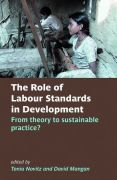
The role of labour standards in development: theory in practice
Novitz, Tonia
Mangan, David
This book considers the previously neglected intersection between work and development and considers how protection of labour standards may be understood in development terms. Examples are given of concrete achievement in anti-discrimination, child labour, trade relations and social dialogue. This edited collection examines the multi-faceted ways in which labour standards can play a role in the achievement of development. A variety of critical perspectives are presented here, with contributions from a number of different disciplines, including law, politics, and economics. The book begins by considering potential theoretical connections between work and development, acknowledging controversyover how the latter should be approached, interpreted and rendered'sustainable'. The remainder of the collection is devoted to an analysis of the part that protection of labour standards can play in developmental terms, with reference to concrete issues: anti-discrimination, child labour, trade relations, and social dialogue. The book concludes with a final chapter, reflectingon how theory has been and could be put into practice.The theme that transcends all the contributions to this collection is that ofhuman agency. The authors are not merely interested in the realisation of an individual person's 'functioning' in society (which development will assist), but also with the ways that people can be engaged in the very process of defining what development aims should and can be. They do not wish to see economic,social and environmental development objectives as being determined by technical experts and implementedaccording to their prescriptions. Rather, they consider development in procedural as well as substantive terms, and in participatory as well as material terms. INDICE: Introduction Part I: Theoretical Connections between Work and Development Comparative institutional advantage in the context of development Human freedom and human capital; re-imagining labour law for development Part II: Addressing social exclusion and discrimination Gender, equality and capabilities Problems of gender, violence, development and labour Promoting social inclusion through anti-discrimination law Part III: Child poverty and child labour as an obstruction to development Understanding the economics of child labour Child labour: What "responsibility" might entail for "responsive" corporations Part IV: Development through trade and/or aid? The very basis of our existence: labour and the neglected environmental dimension of sustainable development Development, the movement of persons, and labour law: trade and aid vs. reasonable labour market access Part V: Achieving development through social dialogue, corporate social responsibility and other participatory strategies Corporate Social Responsibility and Participatory Labour Laws How social dialogue andCSR have met up with traditional international supervision in realizing FPRW Big trade unions and big business: how might international framework agreements promote sustainable development at a local level? Afterword
- ISBN: 978-0-19-726491-1
- Editorial: Oxford University
- Encuadernacion: Rústica
- Páginas: 300
- Fecha Publicación: 27/10/2011
- Nº Volúmenes: 1
- Idioma: Inglés
